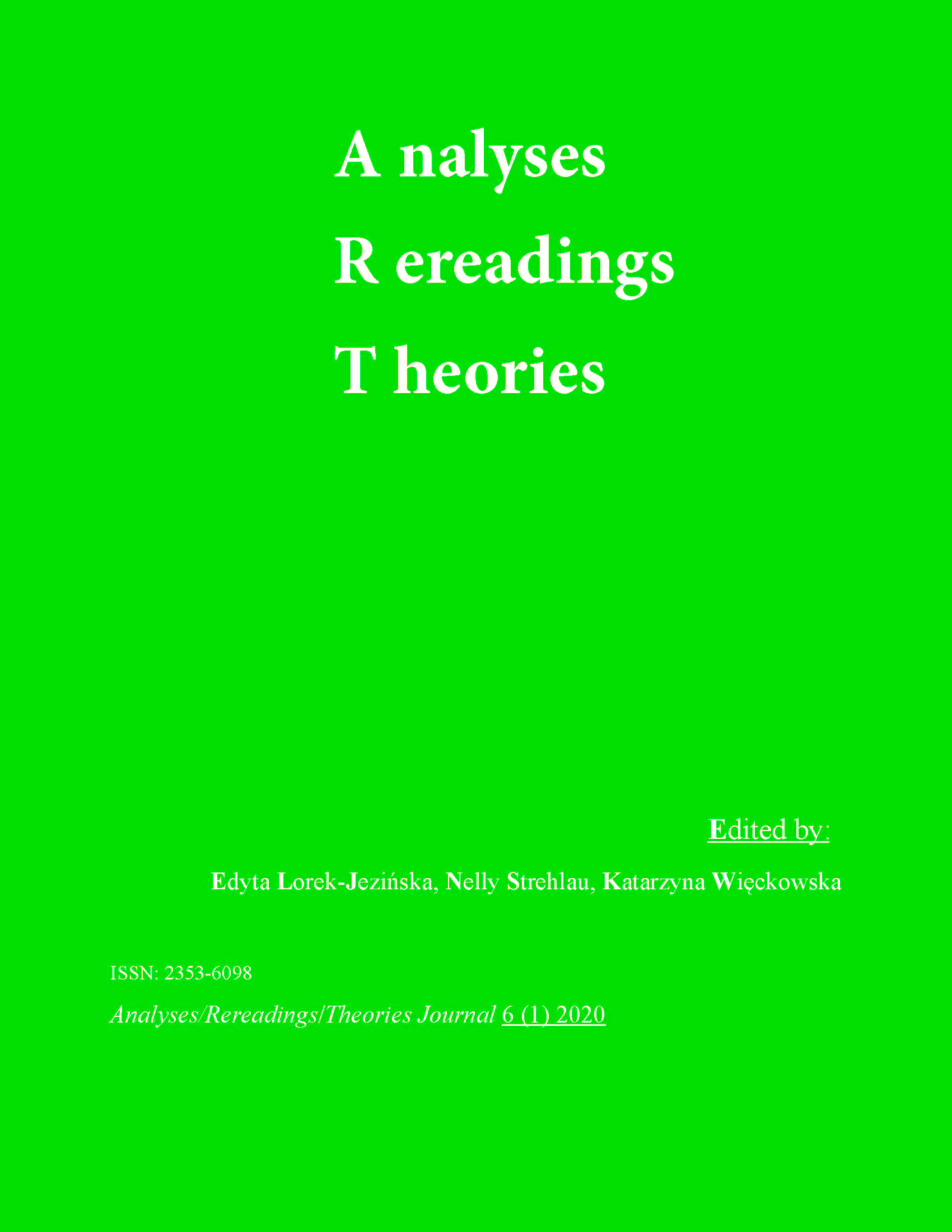Perspectives on Authorship and Authority
DOI:
https://doi.org/10.18778/2353-6098.6.01Keywords:
authorship, authority, death of the author, responsibility, testimony, life-writingAbstract
This article outlines selected shifts in thinking about authorship and authority that have occurred in literary and cultural studies in the aftermath of Roland Barthes’s proclamation of the death of the author, followed by the author’s many revivals. Reconsidering Barthes’s seminal essay and confronting it with Michel Foucault’s query about the author-function, the article comments on Seán Burke’s polemical stance concerning situated authorship. Against these general considerations, several areas in which authorship and authority have been reconceptualized are briefly discussed, referring to the themes addressed in this volume. These areas embrace the problems of representing and using somebody else’s story in visual arts and testimonial theatre, the challenges of individual and cultural situatedness of writing within one’s own output and in reference to more general cultural hauntings as well as the processes of self-formation in the interactions between a variety of texts forming life-writing.
References
Abraham, Nicolas. 1994. “Notes on the Phantom: A Complement to Freud’s Metapsychology” (1975). In: Nicolas Abraham and Maria Torok. The Shell and the Kernel: Renewals of Psychoanalysis, ed. and trans. Nicholas T. Rand. Chicago, London: University of Chicago Press, 171–76.
Google Scholar
Alexander, Jeffrey C. 2004. “Towards a Theory of Cultural Trauma.” In: Cultural Trauma and Collective Identity. Berkeley: University of California Press, 1–30.
Google Scholar
DOI: https://doi.org/10.1525/california/9780520235946.003.0001
Barthes, Roland. 2000. “The Death of the Author.” In: Nigel Wood and David Lodge (eds). Modern Criticism and Theory: A Reader. Harlow, England: Pearson, 146–50.
Google Scholar
Burke, Seán. 1999. The Death and Return of the Author: Criticism and Subjectivity in Barthes, Foucault and Derrida. Edinburgh: Edinburgh University Press.
Google Scholar
Burke, Seán. 2006. “Introduction: Reconstructing the Author.” In: Seán Burke (ed.) Authorship: From Plato to the Postmodern. A Reader. Edinburgh: Edinburgh University Press, xv–xxx.
Google Scholar
Caruth, Cathy. 1995. “Introduction.” In: Cathy Caruth (ed.). Trauma: Explorations in Memory. Baltimore: Johns Hopkins University Press, 151–57.
Google Scholar
Caruth, Cathy. 1996. Unclaimed Experience: Trauma, Narrative, and History. Baltimore: Johns Hopkins University Press.
Google Scholar
Cook, Daniel, and Amy Culley. 2012. “Introduction: Gender, Genre and Authorship.” In: Daniel Cook and Amy Culley (eds). Women’s Life Writing, 1700–1850: Gender, Genre and Authorship. Basingstoke: Palgrave Macmillan, 1–8.
Google Scholar
DOI: https://doi.org/10.1057/9781137030771_1
Derrida, Jacques. 2006. Specters of Marx: The State of the Debt, the Work of Mourning and the New International. Trans. Peggy Kamuf. NY, London: Routledge.
Google Scholar
Felman, Shoshana and Dori Laub. 1992. Testimony: Crises of Witnessing in Literature, Psychoanalysis, and History. London: Routledge.
Google Scholar
Foucault, Michel. 1972. The Archeology of Knowledge and The Discourse on Language. Trans. A. M. Sheridan Smith. New York: Pantheon Books.
Google Scholar
Foucault, Michel. 2000. “What is an Author?” In: Nigel Wood and David Lodge (eds). Modern Criticism and Theory: A Reader. Harlow, England: Pearson, 174–87.
Google Scholar
Gallop, Jane. 2011. The Deaths of the Author: Reading and Writing in Time. Durham: Duke University Press.
Google Scholar
DOI: https://doi.org/10.1515/9780822394532
Hirsch, Marianne. 2008. “The Generation of Postmemory.” Poetics Today 29.1, 103–28.
Google Scholar
DOI: https://doi.org/10.1215/03335372-2007-019
Jameson, Fredric. 1993. “Postmodernism and Consumer Society” (1988). In: Ann Gray and Jim McGuigan (eds). Studying Culture: An Introductory Reader. London: Edward Arnold, 192–205.
Google Scholar
Jameson, Fredric. 2008. “Marx’s Purloined Letter.” In: Michael Sprinker (ed.). Ghostly Demarcations: A Symposium on Jacques Derrida’s Specters of Marx. London: Verso, 26–67.
Google Scholar
Kadar, Marlene. 1992. “Coming to Terms: Life Writing from Genre to Critical Practice.” In: Marlene Kadar (ed.). Essays on Life Writing: From Genre to Critical Practice. Toronto: University of Toronto Press, 3–16.
Google Scholar
DOI: https://doi.org/10.3138/9781442674615-002
Kaplan, E. Ann. 2005. Trauma Culture: The Politics of Terror and Loss in Media and Literature. New Brunswick: Rutgers University Press.
Google Scholar
Leader, Zachary. 2015. “Introduction.” In: Zachary Leader (ed.). On Life-Writing. Oxford: Oxford University Press, 1–6.
Google Scholar
Malkin, Jeanette R. 1999. Memory-theater and Postmodern Drama. Ann Arbor: Michigan University Press.
Google Scholar
DOI: https://doi.org/10.3998/mpub.16064
Morash, Chris, and Shaun Richards. 2013. Mapping Irish Theatre: Theories of Space and Place. Cambridge: Cambridge University Press.
Google Scholar
DOI: https://doi.org/10.1017/CBO9781139600309
Stuart Fisher, Amanda. 2020. Performing the Testimonial: Rethinking Verbatim Dramaturgies. Manchester: Manchester University Press.
Google Scholar
DOI: https://doi.org/10.7765/9781526145758
Summerskill, Clare. 2021. Creating Verbatim Theatre from Oral Histories. New York: Routledge.
Google Scholar
DOI: https://doi.org/10.4324/9780429059773
Downloads
Published
How to Cite
Issue
Section
License

This work is licensed under a Creative Commons Attribution-NonCommercial-NoDerivatives 4.0 International License.









